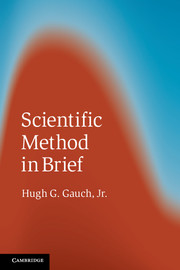Book contents
- Frontmatter
- Contents
- Foreword
- Preface
- 1 Introduction
- 2 Four bold claims
- 3 A brief history of truth
- 4 Science's contested rationality
- 5 Science's presuppositions
- 6 Science's powers and limits
- 7 Deductive logic
- 8 Probability
- 9 Inductive logic and statistics
- 10 Parsimony and efficiency
- 11 Case studies
- 12 Ethics and responsibilities
- 13 Science education
- 14 Conclusions
- References
- Index
13 - Science education
Published online by Cambridge University Press: 05 November 2012
- Frontmatter
- Contents
- Foreword
- Preface
- 1 Introduction
- 2 Four bold claims
- 3 A brief history of truth
- 4 Science's contested rationality
- 5 Science's presuppositions
- 6 Science's powers and limits
- 7 Deductive logic
- 8 Probability
- 9 Inductive logic and statistics
- 10 Parsimony and efficiency
- 11 Case studies
- 12 Ethics and responsibilities
- 13 Science education
- 14 Conclusions
- References
- Index
Summary
What are the benefits for scientists and others from learning the general principles of scientific method? And which scholars have best clarified and documented those benefits?
The first chapter mentioned various positive or negative assessments of these benefits by scientists and philosophers. But it noted that the most careful assessments have been by science educators, while leaving documentation of their findings to this chapter. Six benefits were listed: better comprehension, greater adaptability, greater interest, more realism, better researchers, and better teachers.
Science educators typically place various aspects of scientific method within several broader contexts, including inquiry, practice, and the nature of science (NOS). “For science educators the phrase ‘nature of science,’ is used to describe the intersection of issues addressed by the philosophy, history, sociology, and psychology of science as they apply to and potentially impact science teaching and learning. As such, the nature of science is a fundamental domain for guiding science educators in accurately portraying science to students“ (McComas, Clough, and Almazroa, in McComas 1998:5). Educators and scientists alike perceive the importance of the NOS in the science curriculum (McComas 1998; Khine 2011).
- Type
- Chapter
- Information
- Scientific Method in Brief , pp. 234 - 256Publisher: Cambridge University PressPrint publication year: 2012



